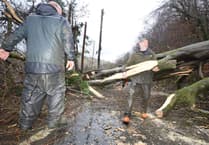IF IT had been up to health officials urged on by Welsh Labour governments, Bronglais Hospital would years ago have become hardly more than a glorified cottage hospital offering little beyond sticking-plasters and sympathy.
People would have died, illnesses would have been left undiagnosed and treatments never carried out. Suffering generally would have soared, while senior management would have raked in brownie-points for cutting spending. Never mind that the economies involved would have been deadly.
The one thing that has kept the rot at bay has been press, public and, to an extent, political vigilance - in tandem with periodic high-profile protest by the public and by health professionals.
Now the old south-focused campaign of attrition against a hospital of literally vital importance to the whole of mid Wales is being revived.
Once more, a health board seemingly incapable of empathising with an entire regional and, crucially, rural population, aided and abetted by governments numbed by apathy and immune to fresh thinking, is up to its old tricks.
The current proposed assault? Hywel Dda health board intends to severely cut back on Bronglais Hospital’s stroke service, snuffing out a dedicated and highly skilled multidisciplinary team providing hyper-acute and acute stroke treatment, and stroke-rehabilitation. For a prime example of managerial and political insanity, look no further.
Strokes are life-threatening and, in an instant, can change lives for the worse. They are Wales’s fourth leading cause of death and disability, and about 7,500 people a year experience one.
NHS protocol categorises all stroke patients as blue-light emergencies needing treatment in a specialist acute unit within an hour. Longer than that and the outlook is bleak.
Hywel Dda brushes all that aside. The core population of 125,000 - not counting tourist influx and university students - served by Bronglais is now threatened with a dramatically debased stroke service. If the board gets its way, the bulk of stroke treatment in future will instead be provided in Llanelli, at the southernmost extremity of the Hywel Dda area.
That’s an at least two-hour, 61-mile, drive from Aberystwyth; up to about 80 miles, two-and-half hours, from points further north and east within the Bronglais catchment.
The ‘golden hour’ in emergency medicine stresses that patients with acute conditions including stroke must receive expert care and treatment within 60 minutes. After that, prospects for recovery can fall significantly. Paramedic guidelines call for stroke patients to be rushed to a hyper-acute unit, such as is well established at Bronglais.
Shamelessly, Hywel Dda health board is intent on tossing a grenade into a stroke treatment protocol designed with the utmost care to save lives and to counter the prospect of patients’ future quality of life being badly compromised.
Ceredigion MS Elin Jones, a Bronglais campaigner for decades, tells me: “Many constituents are already aware and afraid of the proposals to move parts of the stroke services to Llanelli as a central point for the whole of the Hywel Dda area. I will be meeting the health board to raise my concerns.” It’s a concern that will need to be rammed home.
Such is the necessity given the complacency of the message from Lee Davies, the board’s executive director of strategy and planning. He says that initial thrombolysis (breaking up of blood-clots) treatment would continue at Bronglais. And then? After that, patients would face an arduous two-hour-plus transfer to Llanelli. No, Lee, never in a month of Sundays will that be acceptable.
Even in outline, this plan is an outrage. In terms of practicalities, including transport problems for patients without ready access to cars, and round trips of up to 160 miles as they undergo stroke-rehabilitation lasting weeks if not months, it is deeply inhumane.
Contrast the health board’s grim new world with the top-class system Bronglais patients benefit from currently, as reported on by Healthcare Inspectorate Wales after visiting the stroke unit.
They say: “The stroke pathway in operation within the hospital enables direct access to computerised tomography (CT) scanning. The nursing-team receive and act upon stroke pre-alert calls, and meet the patient in the CT suite with the medical emergency team, and together assess patients on arrival at the hospital. The hospital initiates thrombolysis for eligible patients in the CT suite and transfers patients directly to the acute stroke unit.
“The hospital states that the pathway enables them to deliver a high performing service, with the ability to benchmark services in line with larger, better resourced units across the UK.”
It would be nothing short of criminal to destroy this finely-tuned service, designed to maximise, not compromise, stroke patients’ chances of getting their lives back on course.
Twelve years ago, Bronglais consultants, dismayed by a downgrading strategy masterminded by the board’s then chief executive, Trevor Purt, condemned a planned erosion of patient services, which invoked the well-rehearsed and destructive ‘send-them-south’ mantra.
They told Purt: “We have lost all confidence in Hywel Dda Health Board’s commitment to support us in delivering the services we provide locally. The proposal to remove any service is at odds with the ethos of keeping care local, and will have multiple repercussions.”
It’s a message that now urgently needs repeating. With equal force.




